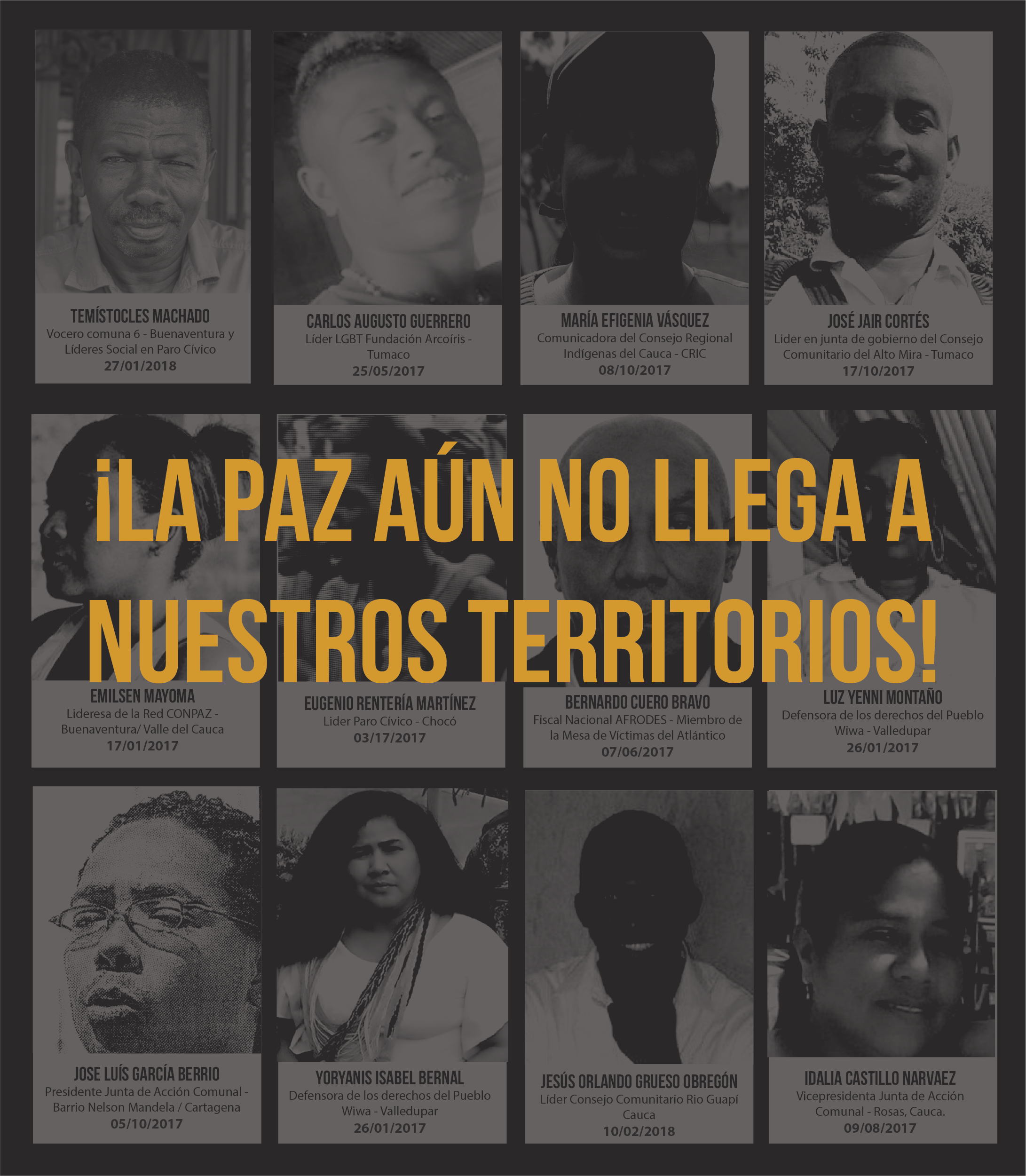Colombia Still Living at War
July 6, 2018 – The Institute on Race, Equality and Human Rights vehemently condemns the killing of eleven social leaders in Colombia this past week in the regions of Cauca, […]

July 6, 2018 – The Institute on Race, Equality and Human Rights vehemently condemns the killing of eleven social leaders in Colombia this past week in the regions of Cauca, Chocó, Atlántico, Antioquía, and Tumaco. We strongly urge the national government and the international community to immediately speak out against the systematic extermination which has plagued the Colombian countryside in the aftermath of the signing of the Peace Accords on September 26, 2016, and which has incremented after the presidential elections this past June 17, 2018.
In the first three days of July, eleven social leaders have been killed, adding to the approximately 282 human rights defenders killed after the signing of the Peace Accords, based on a report from the Colombian Ombudsman’s Office. On July 3, seven bodies were found in the Argelia municipality of the Cauca region – a region which continues to be subjected to territorial disputes after the demobilization of the Revolutionary Armed Forces of Colombia (FARC), and which had shown favoritism for presidential candidate Gustavo Petro with 90% of the region’s votes in his favor. Also reported were the killings of Felicinda Santamaría, Afro-Colombian leader and President of the Board of Communal Action for Commune 2 in Quibdó, Chocó, and Luis Barrios Machado, a social leader from the Atlántico region. Similarly, news surfaced two days ago of the killings of Afro-Colombian leaders Margarita Estupiñan, in the village of Llorente in Tumaco, and Ana María Cortés in Antioquia, who worked as a campaign coordinator for Gustavo Petro in the region.
The systematic violence in Colombia has increasingly claimed the lives of various social leaders, who are victims of assassinations, threats and hostility as a result of their political work. The majority of the recent killings have been against Afro-Colombian women, indigenous and campesino men, and social groups who have been historically targeted by violence, and face poverty and inequality. “Peace has not yet reached our territories, and we (Afro-Colombians) are the ones who are dying. The Colombian countryside continues to be at war, the conflict has not ended, and, what’s worse, we are completely defenseless because the national government has not responded in any way, whatsoever. Our people are being killed constantly, and yet it would seem as though this isn’t noteworthy – it’s not important,” stressed Erlendy Cuero Bravo, Afro-Colombian leader who has been the recipient of threats and hostility for her work as Vice-President of the National Association of Displaced Afro-Colombians (AFRODES).
With great concern, we call on the national government of Colombia to carry out the appropriate investigations of the events as soon as possible, to reject the impunity of these killings and to grant protection measures to leaders who continue to be at risk. We also call on the international community in solidarity of this national emergency and urge the Colombian government to take the necessary measures to protect lives and put an end to the killings, which are systematically ending the lives of Afro-Colombian leaders. We demand special attention to the extermination, threats and intimidation that have plagued Afro-descendant, indigenous, and rural communities which have been historically marginalized, discriminated against, and subject to violence, poverty, and violations of their fundamental right to a dignified life. We denounce the ongoing threats against the lives of women who are human rights defenders and are victims in life-threatening conditions as a result of their efforts to be included in spaces for dialogue and participation. We remind the Colombian State of its basic obligations adopted in relation to the respect for and guarantee of rights under the subscribed international treaties, such as the International Covenant on Civil and Political Rights and the American Convention on Human Rights. As such, we encourage the national government to abide by these treaties, as well as to take into consideration the recommendations on human rights made to the State during the recent Universal Periodic Review, during which the international community at large issued a specific call to the Colombian State to protect the lives of human rights defenders, and to implement protection mechanisms to guarantee that their work is not criminalized.

